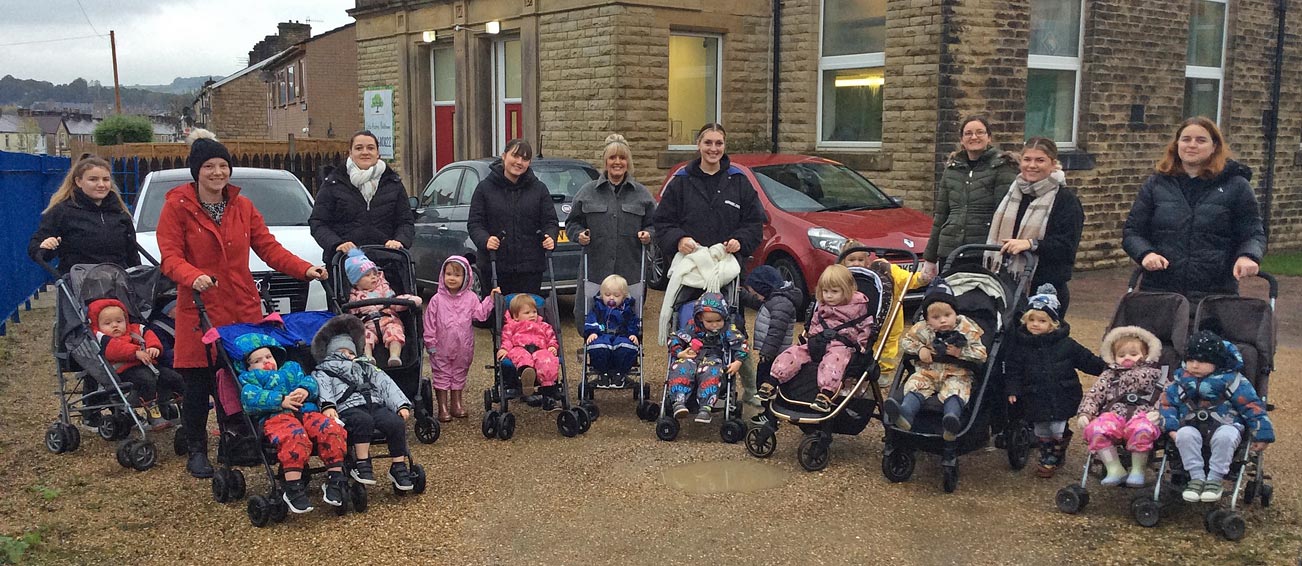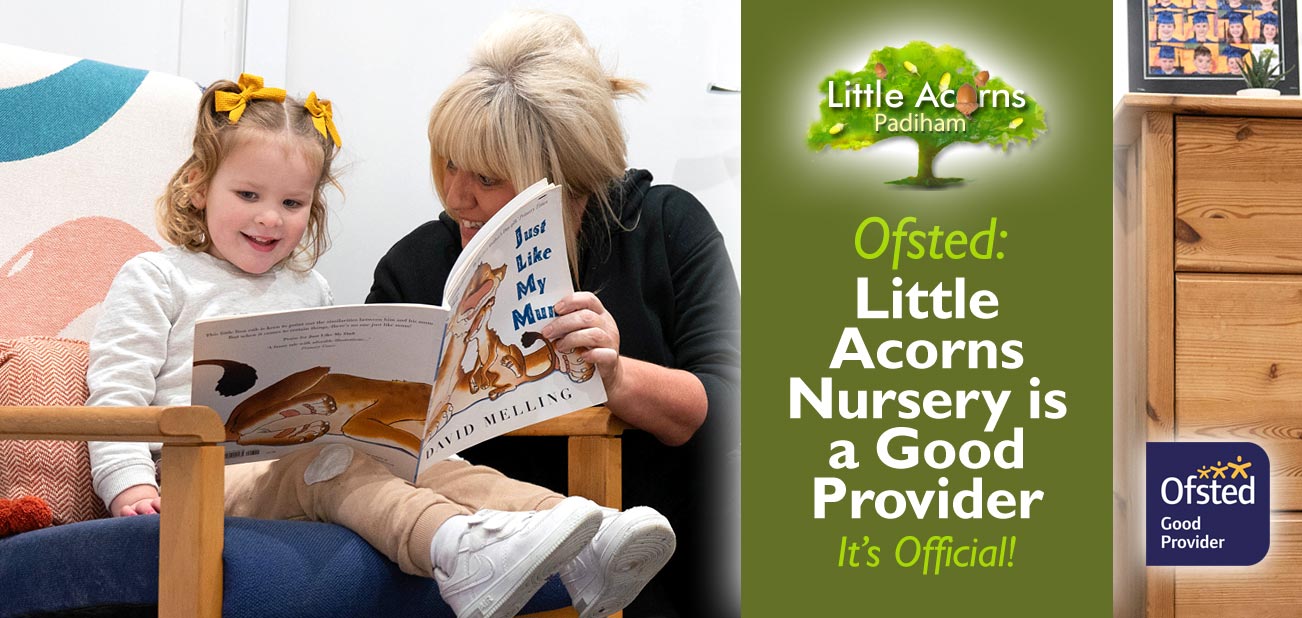
 We’re delighted to announce that Ofsted has published a stunning report for Little Acorns Nursery, Padiham. It’s now official that this excellent Padiham childcare setting is a ‘Good Provider’ — in every category! What’s more, the Ofsted inspector published some wonderfully positive comments about the nursery, staff, and quality of care as part of the report. Their findings are a testament to the high quality of the setting, the professionalism of its early years practitioners and leadership, and the positive impact the nursery has on babies and children in its care. Today, we take a deep dive into the details.
We’re delighted to announce that Ofsted has published a stunning report for Little Acorns Nursery, Padiham. It’s now official that this excellent Padiham childcare setting is a ‘Good Provider’ — in every category! What’s more, the Ofsted inspector published some wonderfully positive comments about the nursery, staff, and quality of care as part of the report. Their findings are a testament to the high quality of the setting, the professionalism of its early years practitioners and leadership, and the positive impact the nursery has on babies and children in its care. Today, we take a deep dive into the details.
• Overall effectiveness: Good
• The quality of education: Good
• Behaviour and attitudes: Good
• Personal development: Good
• Leadership & management: Good
A Welcoming, Safe & Secure Environment for ChildrenIn her report, the Ofsted inspector recognised the warm, welcoming, safe and secure nature of the setting and early years practitioners:
Such a positive environment and approach by staff is clearly being reflected in the children:
|
Independence & Self-Confidence in Little OnesThe inspector also had positive comments about children learning new skills, gaining in confidence, and becoming more independent — important for when they transition to school. Helped by “high aspirations for what children can do,” Ofsted follows up by saying “The expectations are well sequenced throughout the nursery, helping to build on children’s skills over time.” Ofsted remarked that “From babies upwards, they encourage children to have a go” and, as a result…
|
The Nursery’s Approach to the Early Years CurriculumThe Ofsted inspector seemed particularly impressed with the nursery’s approach to the early years curriculum, remarking that:
Targeted staff training, focused on the needs of the children, was also seen to be part of this success, with the Ofsted inspector commenting that it “has positively impacted on the implementation of the curriculum.” Indeed, the success of such an approach was seen to be working well right across the nursery, boosting children’s learning:
Assessment of children’s progress was also highly praised:
|
What About Children with SEND?The approaches outlined above were seen to apply well to children who may need extra support and those with special educational needs and/or disabilities:
Parents spoken to by the Ofsted Inspector also appreciated the nursery’s approach to extra help for children, including those with SEND:
|
Children’s Communication & LanguageOfsted recognised the nursery’s approach to boosting children’s language and communication skills in their report too. The inspector commented on our staff:
|
Children’s Learning StepsOfsted’s inspector praised Little Acorns’ staff in their approach to learning steps, commenting:
The inspector went on to say that such activities and experiences help to “build on children’s knowledge” and then gave some examples. |
Reading & Writing at Little AcornsThe Ofsted inspector commented favourably about the way in which staff at Little Acorns Nursery support the learning of the skills necessary to read and write. Children are also encouraged to develop a natural and active interest in books and reading. The inspector wrote, “Children are provided with the opportunities to develop the skills they will need for later writing” and “Leaders value the importance of providing lots of opportunities for children to enjoy stories. They provide a wide range of books for children to explore.” Coordination and dexterity were noted to be an important part of these successes:
Ofsted recognised that staff “Staff support children’s hand-eye coordination superbly. They have consulted with the local schools and used this to enhance the curriculum to ensure children develop the dexterity needed to support later writing.” |
Behaviour & Emotional Regulation at the NurseryDuring their visit, Ofsted recognised that children behaved well and that their emotional regulation skills were being nurtured appropriately by the nursery’s practitioners:
|
Healthy Lifestyles & Good ChoicesThe Ofsted inspector noted in her report that:
She pointed out that “Children benefit from many experiences to play outside in the fresh air and by walking in the community.” Also, in regard to healthy eating, she remarked: “Staff talk to children at mealtimes about the impact of food on their bodies. Children are beginning to know how to keep their bodies healthy. They talk about the need to keep their bodies hydrated and check that their friends have also had a drink of water.” Ofsted also recognised that children’s kindness is reflected in their treatment of the environment:
|
Effective SafeguardingOne of the most important things at any nursery is, of course, to keep children safe and well. Little Acorns Nursery scored well in this regard too, with the Ofsted inspector reporting that “the arrangements for safeguarding are effective” and:
|
Good Provision
It’s wonderful that Ofsted has recognised the hard work and professionalism at Little Acorns Nursery, Padiham. It’s clear that it’s benefiting children and enabling them to be as school-ready as possible by the time they leave us around the age of five. And, if there are areas we can still improve on, we will implement such measures without delay — all with a view to making children’s experiences at the nursery simply outstanding!
A Nursery Place for Your Child at Little Acorns
High-quality childcare in Padiham — for babies (3m+) and children under 5
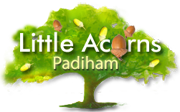
 If you like the sound of the Ofsted inspector’s comments and need high-quality weekday childcare in Padiham, Lancashire, get in touch. You can register for a place, request a guided tour with your child, or ask us any questions. We’re here to help and would love to meet you and your child! We also support free, government-funded childcare places for eligible children as young as just 9 months of age.
If you like the sound of the Ofsted inspector’s comments and need high-quality weekday childcare in Padiham, Lancashire, get in touch. You can register for a place, request a guided tour with your child, or ask us any questions. We’re here to help and would love to meet you and your child! We also support free, government-funded childcare places for eligible children as young as just 9 months of age.
Little Acorns Nursery is located in Padiham (Lancashire), so is just a stone’s throw away for families living in Hapton, Rose Grove, Burnley, Altham, Huncoat, Read, Simonstone, Sabden, Higham and Wood End. If you need weekday childcare, come and see us – we’d love to meet you!
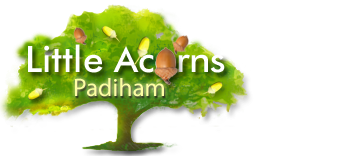
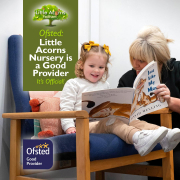
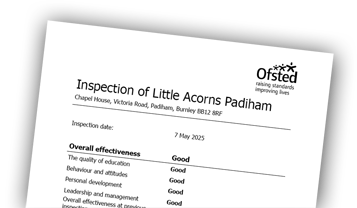
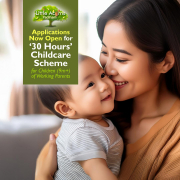
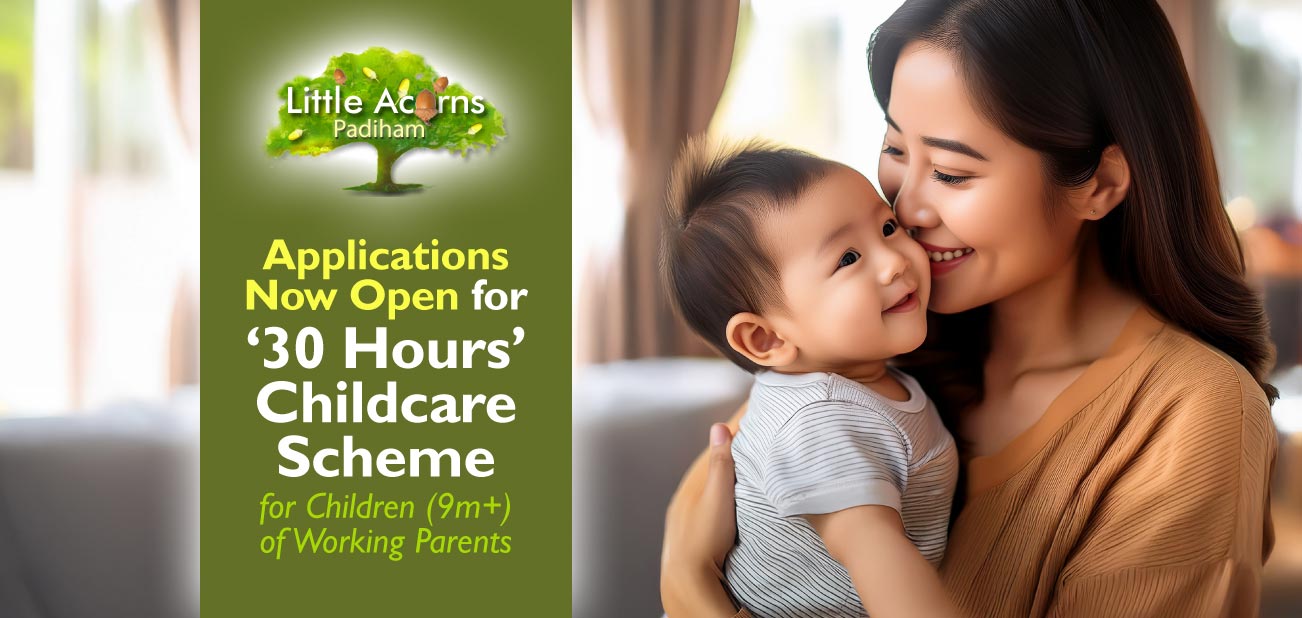
 Attention working families: applications are now open for eligible children, aged from only 9 months, to receive 1140 hours of free childcare per year from September 2025. What’s noteworthy is that this will be the first time such young infants and toddlers can access so many free hours. It effectively doubles the number of free childcare hours previously available to those under 2 via the scheme. The new, extended funding is for eligible working families, who now have until the 31st of August to apply if they would like their child(ren) to start in the September 2025 term.
Attention working families: applications are now open for eligible children, aged from only 9 months, to receive 1140 hours of free childcare per year from September 2025. What’s noteworthy is that this will be the first time such young infants and toddlers can access so many free hours. It effectively doubles the number of free childcare hours previously available to those under 2 via the scheme. The new, extended funding is for eligible working families, who now have until the 31st of August to apply if they would like their child(ren) to start in the September 2025 term. This newly extended scheme will be profoundly beneficial to parents, children, the business world, and the economy. Let’s take a look:
This newly extended scheme will be profoundly beneficial to parents, children, the business world, and the economy. Let’s take a look: The funded childcare is for children of working parents with earnings within the specific range outlined below. Under this scheme, children receiving the free hours from the September 2025 term must be aged no less than 9 months old on 1st September 2025 and free funding for those who remain eligible is available right up until school age.
The funded childcare is for children of working parents with earnings within the specific range outlined below. Under this scheme, children receiving the free hours from the September 2025 term must be aged no less than 9 months old on 1st September 2025 and free funding for those who remain eligible is available right up until school age. As our families regularly confirm, Little Acorns in Padiham is a highly-regarded childcare nursery that attracts
As our families regularly confirm, Little Acorns in Padiham is a highly-regarded childcare nursery that attracts 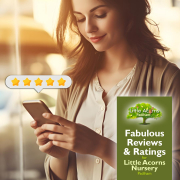

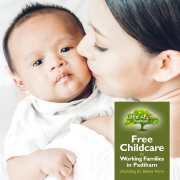
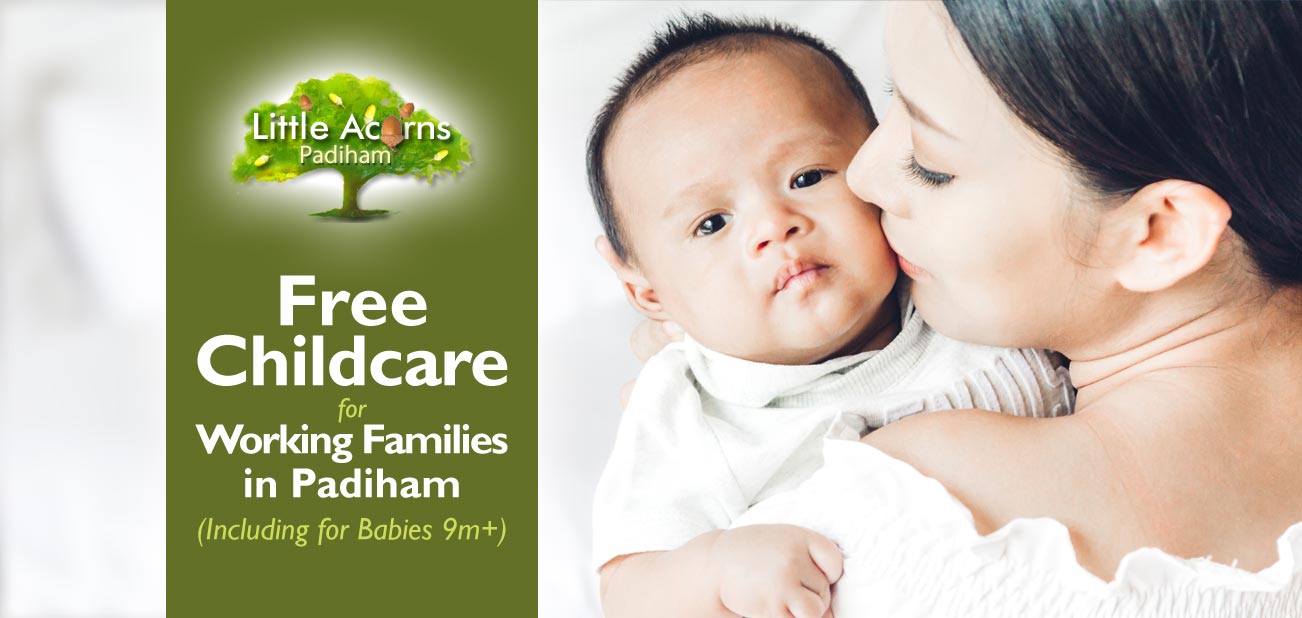
 Today, we remind Padiham families that Little Acorns Nursery supports the new — free — childcare scheme for eligible children including babies as young as just 9 months of age. Although it’s available only to eligible working families, the bar to entry is fairly low. The childcare funding is therefore attainable for many families. This free childcare is not just limited to babies either and, what’s more, it’s due to become even more generous from September 2025. In our guide below we’ll outline who is eligible, how much childcare funding they can access, how many childcare hours that equates to, and what the eligibility criteria are. If you’re the parent of a baby, toddler, or child up to three years old, this is for you.
Today, we remind Padiham families that Little Acorns Nursery supports the new — free — childcare scheme for eligible children including babies as young as just 9 months of age. Although it’s available only to eligible working families, the bar to entry is fairly low. The childcare funding is therefore attainable for many families. This free childcare is not just limited to babies either and, what’s more, it’s due to become even more generous from September 2025. In our guide below we’ll outline who is eligible, how much childcare funding they can access, how many childcare hours that equates to, and what the eligibility criteria are. If you’re the parent of a baby, toddler, or child up to three years old, this is for you. For those working families who are eligible, the scheme provides 570 hours per year of free childcare to children aged from 9 months to 3 years. This is normally taken as 15 hours per week for 38 weeks, usually aligning with the standard educational term-time weeks for school timetables. That said, it may be possible to stretch the hours over more weeks of the year if your childcare provider is able to accommodate such flexibility.
For those working families who are eligible, the scheme provides 570 hours per year of free childcare to children aged from 9 months to 3 years. This is normally taken as 15 hours per week for 38 weeks, usually aligning with the standard educational term-time weeks for school timetables. That said, it may be possible to stretch the hours over more weeks of the year if your childcare provider is able to accommodate such flexibility. We’ll try to simplify the eligibility criteria for you. Whether it’s for a baby aged 9 months, a toddler of 1 or 2, or a child aged 3 or 4, there are essentially four main criteria for this specific type of childcare funding:
We’ll try to simplify the eligibility criteria for you. Whether it’s for a baby aged 9 months, a toddler of 1 or 2, or a child aged 3 or 4, there are essentially four main criteria for this specific type of childcare funding: Well, it’s good news. It’s already the case that all 3 and 4-year-olds living in England are eligible to receive 570 hours (15 per week) of free childcare anyway. That’s available under what’s known as ‘Universal Entitlement’, a Government childcare funding scheme that’s been around for some time. What’s more, those working families that are eligible for the ‘new’ free childcare for children aged 9 months to 3 years are also likely to be eligible for a top-up of their child’s Universal Entitlement once they reach the ages of 3 and 4. In those cases, they’ll be entitled to 30 hours per week over 38 weeks (or however the 1140 free hours are spread out). That’s because the eligibility criteria are the same (see section above).
Well, it’s good news. It’s already the case that all 3 and 4-year-olds living in England are eligible to receive 570 hours (15 per week) of free childcare anyway. That’s available under what’s known as ‘Universal Entitlement’, a Government childcare funding scheme that’s been around for some time. What’s more, those working families that are eligible for the ‘new’ free childcare for children aged 9 months to 3 years are also likely to be eligible for a top-up of their child’s Universal Entitlement once they reach the ages of 3 and 4. In those cases, they’ll be entitled to 30 hours per week over 38 weeks (or however the 1140 free hours are spread out). That’s because the eligibility criteria are the same (see section above).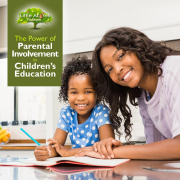
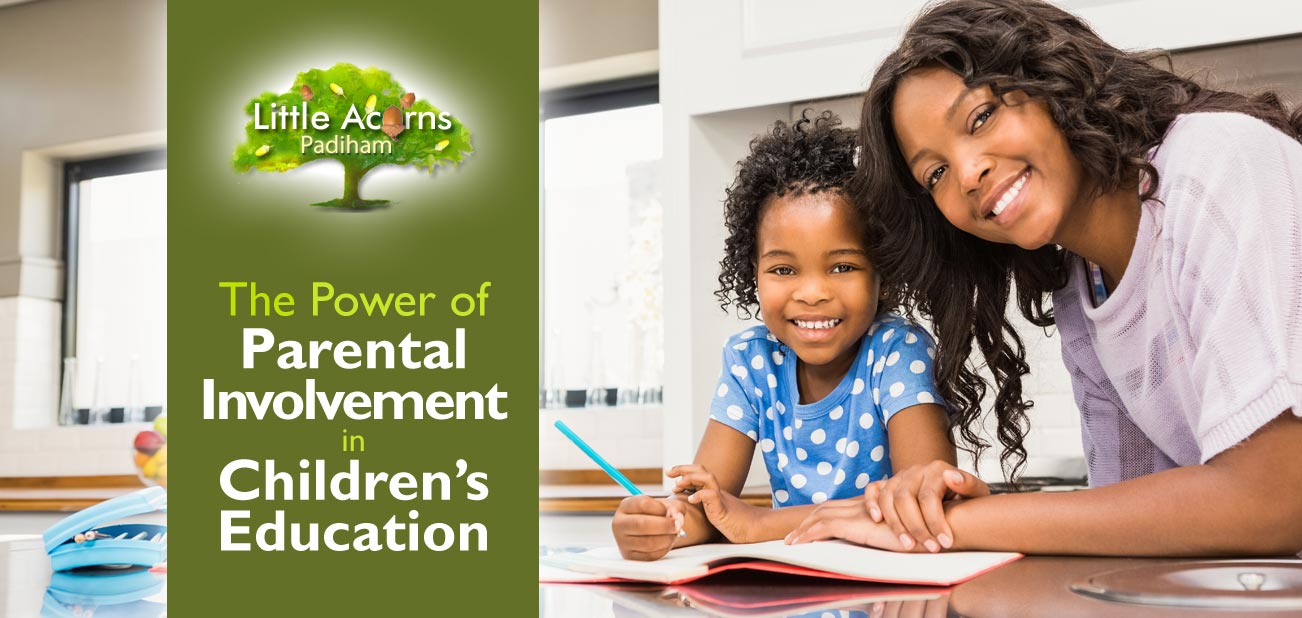
 Parental involvement in a child’s education can take several forms. Note, however, that the benefits are most positive when parents engage right from the early years, beginning in children’s nursery and preschool years. The examples below show the kinds of parental involvement that will enhance children’s lives:
Parental involvement in a child’s education can take several forms. Note, however, that the benefits are most positive when parents engage right from the early years, beginning in children’s nursery and preschool years. The examples below show the kinds of parental involvement that will enhance children’s lives: Applying that information in the form of help and support while the child is at home. Referring to the right textbooks, helping with homework, and helping the child understand any tricky topics are typical examples of areas where parents can help children at home.
Applying that information in the form of help and support while the child is at home. Referring to the right textbooks, helping with homework, and helping the child understand any tricky topics are typical examples of areas where parents can help children at home. When children do well, praising them will encourage them to keep up the good work. It’ll give them a greater sense of achievement, and some moral support, and help instil a love for learning in them.
When children do well, praising them will encourage them to keep up the good work. It’ll give them a greater sense of achievement, and some moral support, and help instil a love for learning in them. Let’s now look at some of the benefits that children can expect to enjoy when parents are closely involved in their education.
Let’s now look at some of the benefits that children can expect to enjoy when parents are closely involved in their education. The benefits of parental involvement in education to children are numerous, though, also including the lowering of stress levels and improved knowledge, skills, outlook and outcomes. The deep and reliable source of support, together with all the other benefits, also combine to make children feel happier, have a higher quality of life, be less likely to skip lessons, be well-behaved, and have closer bonds with both parents and childcare/education staff.
The benefits of parental involvement in education to children are numerous, though, also including the lowering of stress levels and improved knowledge, skills, outlook and outcomes. The deep and reliable source of support, together with all the other benefits, also combine to make children feel happier, have a higher quality of life, be less likely to skip lessons, be well-behaved, and have closer bonds with both parents and childcare/education staff.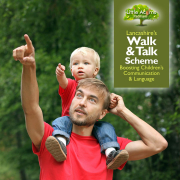
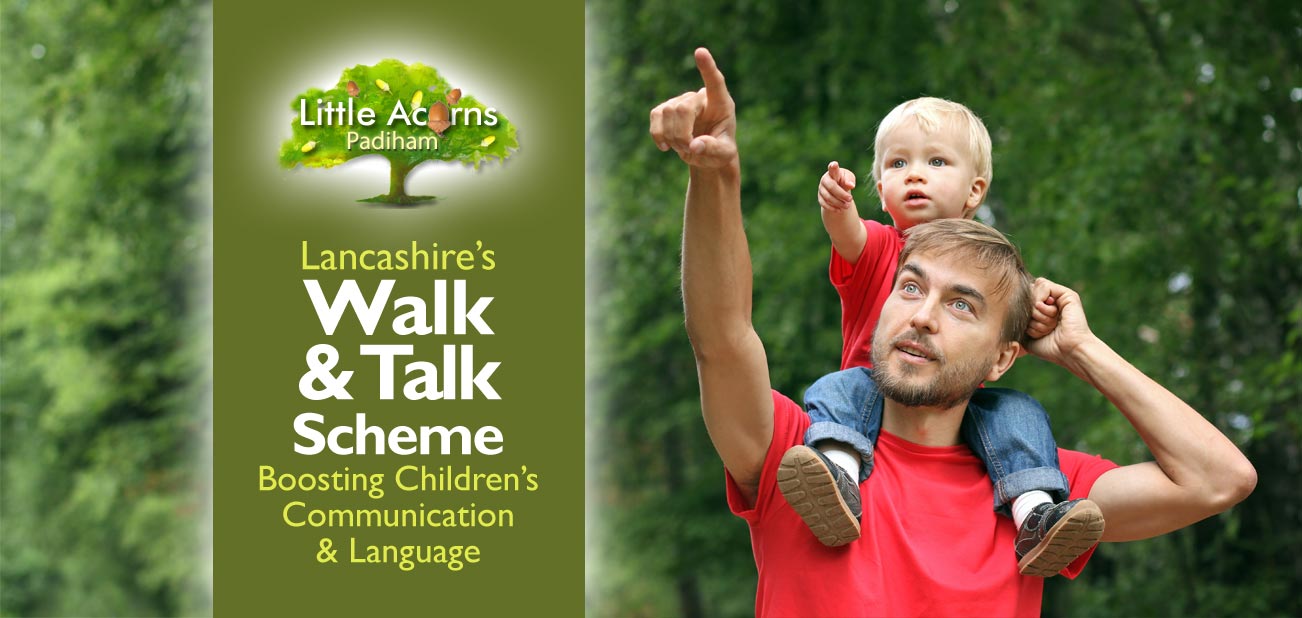
 Lancashire’s Walk & Talk Initiative is a scheme that’s wholeheartedly supported by the childcare practitioners at Little Acorns Nursery in Padiham. We encourage all Lancashire parents to take part too. It’s an initiative that is incredibly simple but has far-reaching benefits for children in their early years. Let’s take a look today at what Walk & Talk is all about, what its aims are, the benefits to children, and how families can get involved.
Lancashire’s Walk & Talk Initiative is a scheme that’s wholeheartedly supported by the childcare practitioners at Little Acorns Nursery in Padiham. We encourage all Lancashire parents to take part too. It’s an initiative that is incredibly simple but has far-reaching benefits for children in their early years. Let’s take a look today at what Walk & Talk is all about, what its aims are, the benefits to children, and how families can get involved.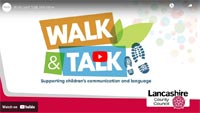
 a reduction in the ‘word gap’ — helping children learn new words and widen vocabulary;
a reduction in the ‘word gap’ — helping children learn new words and widen vocabulary;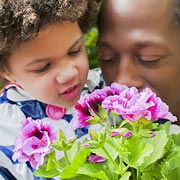 The scheme also aims to encourage children to use a variety of senses. These include, for example, sight, smell, touch, taste, hearing and, of course, active listening. When out on walks there are so many different things for children’s senses to be stimulated by and each lends itself to a conversation. Whether it’s the sound of birdsong, the feeling of the wind on their faces, the smell of freshly-cut grass on the breeze, the noise of traffic, the dazzlingly beautiful colours of blossom, or the mouth-watering smell of food cooking around the neighbourhood or town, walking is indeed a feast for the senses.
The scheme also aims to encourage children to use a variety of senses. These include, for example, sight, smell, touch, taste, hearing and, of course, active listening. When out on walks there are so many different things for children’s senses to be stimulated by and each lends itself to a conversation. Whether it’s the sound of birdsong, the feeling of the wind on their faces, the smell of freshly-cut grass on the breeze, the noise of traffic, the dazzlingly beautiful colours of blossom, or the mouth-watering smell of food cooking around the neighbourhood or town, walking is indeed a feast for the senses.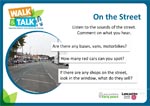
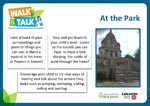
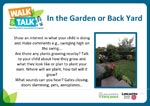
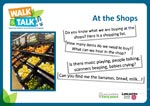
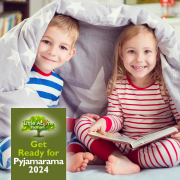
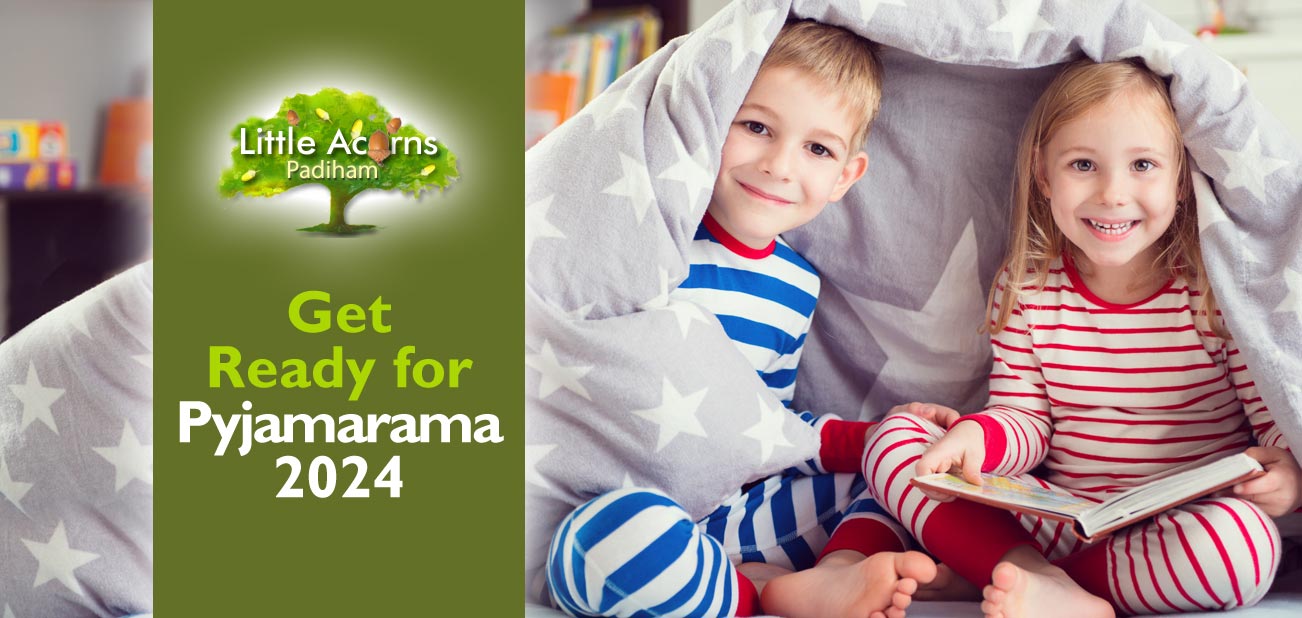
 Pyjamarama is a one-day fundraising event that’s organised through the children’s reading charity BookTrust. It takes place each year across a variety of UK settings including homes, schools, preschools, nurseries and more. As well as being great fun for those organising and taking part, the initiative is beneficial to millions of disadvantaged children. The ultimate aim is to raise money to fund the purchase of books and resources, so that every child in the UK gets the chance for bedtime stories and each family has proper reading opportunities. The initiative is hugely popular, great fun, and transforms lives. Today, we take a look at what to expect, how to get involved, and the many benefits of Pyjamarama.
Pyjamarama is a one-day fundraising event that’s organised through the children’s reading charity BookTrust. It takes place each year across a variety of UK settings including homes, schools, preschools, nurseries and more. As well as being great fun for those organising and taking part, the initiative is beneficial to millions of disadvantaged children. The ultimate aim is to raise money to fund the purchase of books and resources, so that every child in the UK gets the chance for bedtime stories and each family has proper reading opportunities. The initiative is hugely popular, great fun, and transforms lives. Today, we take a look at what to expect, how to get involved, and the many benefits of Pyjamarama. Pyjamarama is always a fun day for both adults and children. The added aspect of pyjamas makes it special, quirky and relaxed. And, at the end of the day, it’s incredibly worthwhile. Not only does it raise money to give disadvantaged children and their families opportunities for reading and bedtime stories, but it also encourages those children taking part in Pyjamarama to read more, for pleasure as much as anything. Additionally, it gives children a different perspective and encourages altruism and empathy for others less fortunate than themselves.
Pyjamarama is always a fun day for both adults and children. The added aspect of pyjamas makes it special, quirky and relaxed. And, at the end of the day, it’s incredibly worthwhile. Not only does it raise money to give disadvantaged children and their families opportunities for reading and bedtime stories, but it also encourages those children taking part in Pyjamarama to read more, for pleasure as much as anything. Additionally, it gives children a different perspective and encourages altruism and empathy for others less fortunate than themselves.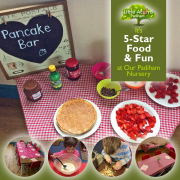
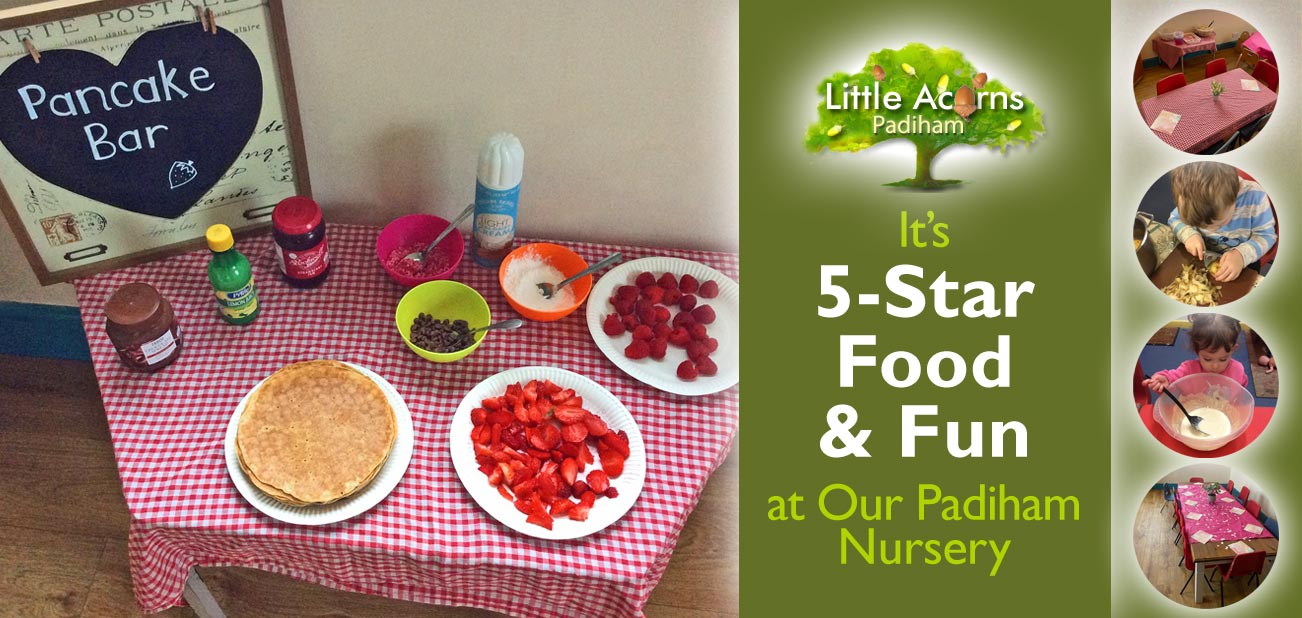
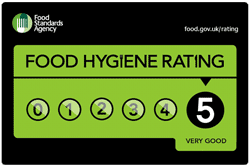 Our Padiham nursery had its annual inspection by the local Environmental Health Officer recently. The purpose was to ensure, as required in all settings serving food, that Little Acorns Nursery has high standards of hygiene and follows the food preparation guidelines specified by the UK’s Food Standards Agency. Once again, Little Acorns Nursery passed with flying colours, achieving a full 5-star rating. That’s the best rating possible and reflects the highest levels of quality for food preparation, the food itself, cleanliness, and competence of staff. So, our thanks and utmost respect go to Kim, our in-house chef/cook, whose high standards, skill and expertise do the children and the nursery proud.
Our Padiham nursery had its annual inspection by the local Environmental Health Officer recently. The purpose was to ensure, as required in all settings serving food, that Little Acorns Nursery has high standards of hygiene and follows the food preparation guidelines specified by the UK’s Food Standards Agency. Once again, Little Acorns Nursery passed with flying colours, achieving a full 5-star rating. That’s the best rating possible and reflects the highest levels of quality for food preparation, the food itself, cleanliness, and competence of staff. So, our thanks and utmost respect go to Kim, our in-house chef/cook, whose high standards, skill and expertise do the children and the nursery proud.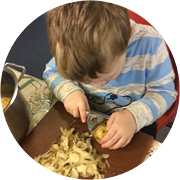 Because the recipe heavily involved potatoes, this also tied in nicely with the book Supertato, which our preschoolers have been looking at in tandem with discussions about food and the importance of a healthy diet. The photo shows one of the children peeling potatoes. Others peeled vegetables and even made their own dumplings. The fun activity helped to nurture children’s learning and the development of new skills and knowledge. The final result was both tasty and a huge hit with the little ones!
Because the recipe heavily involved potatoes, this also tied in nicely with the book Supertato, which our preschoolers have been looking at in tandem with discussions about food and the importance of a healthy diet. The photo shows one of the children peeling potatoes. Others peeled vegetables and even made their own dumplings. The fun activity helped to nurture children’s learning and the development of new skills and knowledge. The final result was both tasty and a huge hit with the little ones!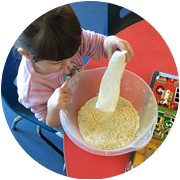 Shrove Tuesday, a.k.a. Pancake Day, arrived on the 13th of February and it gave us a great opportunity to organise pancake-themed activities for the nursery/preschool children … for the entire week! After all, who doesn’t love pancakes? So, as you’ve no doubt guessed by now, our Recipe of the Month for February was home-made pancakes and it’s a recipe the children really enjoyed getting involved in. They loved mixing ingredients in a bowl to make their own pancake mix. We even set up a ‘Pancake Bar’ (see the main photo at the top), which included lots of yummy toppings that children could use to decorate their pancakes. The toppings included strawberries, bananas, chocolate spread, jam, lemon, sprinkles, honey and cream.
Shrove Tuesday, a.k.a. Pancake Day, arrived on the 13th of February and it gave us a great opportunity to organise pancake-themed activities for the nursery/preschool children … for the entire week! After all, who doesn’t love pancakes? So, as you’ve no doubt guessed by now, our Recipe of the Month for February was home-made pancakes and it’s a recipe the children really enjoyed getting involved in. They loved mixing ingredients in a bowl to make their own pancake mix. We even set up a ‘Pancake Bar’ (see the main photo at the top), which included lots of yummy toppings that children could use to decorate their pancakes. The toppings included strawberries, bananas, chocolate spread, jam, lemon, sprinkles, honey and cream.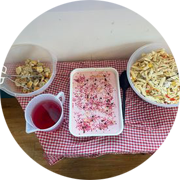 Valentine’s Day, which arrived on the 14th of February, also involved lots of food. After all, as the saying goes, it is often thought of as the language of love! At the nursery, we organised a lovely Grab ‘n’ Go Breakfast for our parents. This was followed by a special 3-course Valentine’s Day meal for our children in our lovely new dining room, which was set up like a little restaurant (see the photos). Children had sausage rolls to start, cheesy chicken and red pepper pasta for the main course and strawberry mousse – with sprinkles – for pudding. Accompanying this was some delicious blackcurrant juice. It all went down a treat with our nursery children, as did several other activities that were themed towards Valentine’s Day.
Valentine’s Day, which arrived on the 14th of February, also involved lots of food. After all, as the saying goes, it is often thought of as the language of love! At the nursery, we organised a lovely Grab ‘n’ Go Breakfast for our parents. This was followed by a special 3-course Valentine’s Day meal for our children in our lovely new dining room, which was set up like a little restaurant (see the photos). Children had sausage rolls to start, cheesy chicken and red pepper pasta for the main course and strawberry mousse – with sprinkles – for pudding. Accompanying this was some delicious blackcurrant juice. It all went down a treat with our nursery children, as did several other activities that were themed towards Valentine’s Day.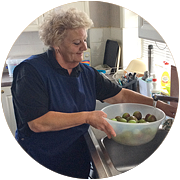 Kim, our talented in-house chef, prepares tasty home-made meals and healthy snacks for children at the nursery. Meals are prepared freshly, on site, using high-quality ingredients, which are locally sourced whenever possible. They are delicious as well as being nutritionally balanced to include a healthy mix of fish, meat, pulses and vegetables.
Kim, our talented in-house chef, prepares tasty home-made meals and healthy snacks for children at the nursery. Meals are prepared freshly, on site, using high-quality ingredients, which are locally sourced whenever possible. They are delicious as well as being nutritionally balanced to include a healthy mix of fish, meat, pulses and vegetables. 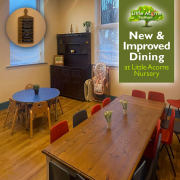
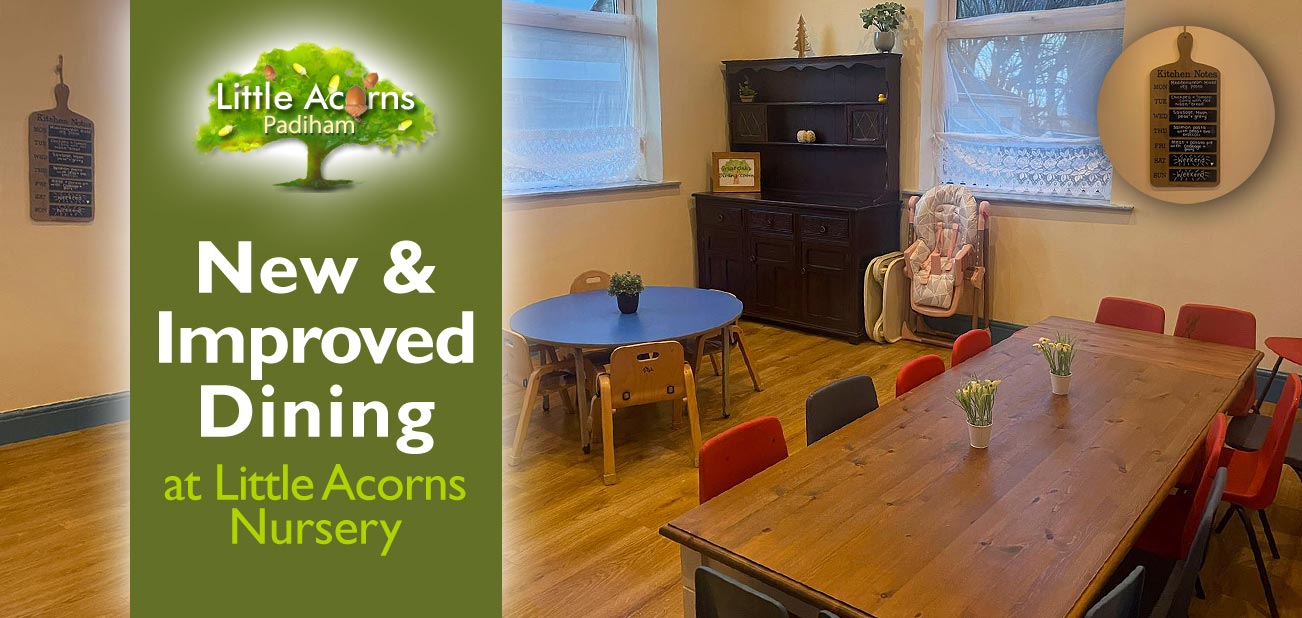
 To make way for the new children’s dining room, an existing room at the setting was repurposed and totally revamped. Starting in Summer 2023, the contents of the existing room were sorted and relocated where needed, leaving a wonderful new space to use as the new ‘Great Oaks’ dining room. Walls, ceilings and skirting boards were prepared and freshened up with new paint. Attractive William Morris-style wallpaper was also hung on a ‘feature’ wall. Large canvas wall images were displayed to form interesting focal points and storage was added in the form of a large cabinet and a small cupboard. Large and small dining room tables and chairs were added for the different age groups along with high chairs, which will be close at hand whenever needed. All this sits on a durable floor with an attractive wood finish. All in all, the outcome is a pleasant home-from-home for children.
To make way for the new children’s dining room, an existing room at the setting was repurposed and totally revamped. Starting in Summer 2023, the contents of the existing room were sorted and relocated where needed, leaving a wonderful new space to use as the new ‘Great Oaks’ dining room. Walls, ceilings and skirting boards were prepared and freshened up with new paint. Attractive William Morris-style wallpaper was also hung on a ‘feature’ wall. Large canvas wall images were displayed to form interesting focal points and storage was added in the form of a large cabinet and a small cupboard. Large and small dining room tables and chairs were added for the different age groups along with high chairs, which will be close at hand whenever needed. All this sits on a durable floor with an attractive wood finish. All in all, the outcome is a pleasant home-from-home for children.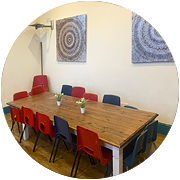
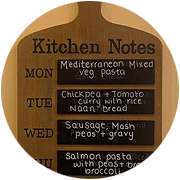
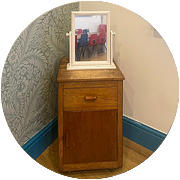
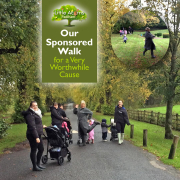
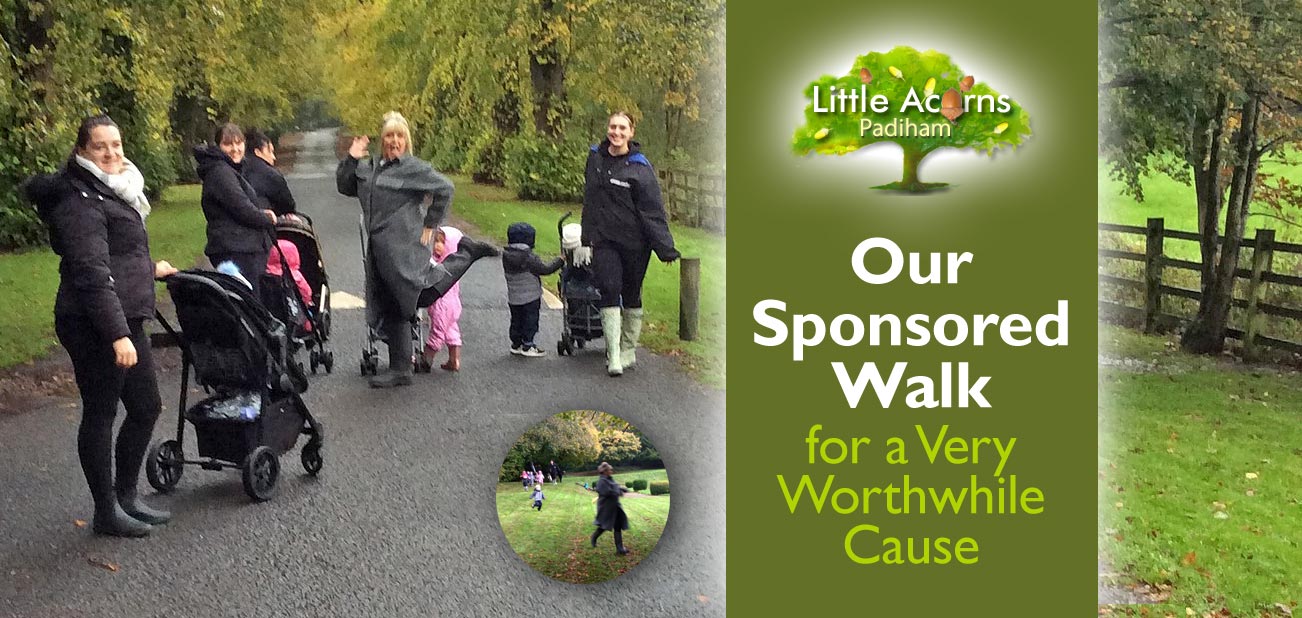
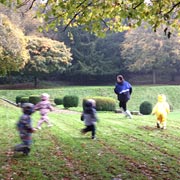 During the autumn half-term break, adults and children from Little Acorns Nursery in Padiham embarked on a sponsored walk around Gawthorpe Park. The walk took place during a cold and wet Tuesday, on 24th October, with children from our Little Seedlings, Little Acorns and Great Oaks rooms donning Wellington boots, anoraks and wet weather gear for the task. Once assembled, little ones and adults braved the inclement weather and went on to complete the walk admirably, even making the local Burnley Express paper
During the autumn half-term break, adults and children from Little Acorns Nursery in Padiham embarked on a sponsored walk around Gawthorpe Park. The walk took place during a cold and wet Tuesday, on 24th October, with children from our Little Seedlings, Little Acorns and Great Oaks rooms donning Wellington boots, anoraks and wet weather gear for the task. Once assembled, little ones and adults braved the inclement weather and went on to complete the walk admirably, even making the local Burnley Express paper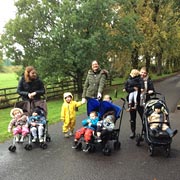 When the rain persisted, children were also encouraged to use magic wands to wish it away!
When the rain persisted, children were also encouraged to use magic wands to wish it away! The sponsored walk was dedicated to a cause that’s extremely close to our hearts — the memory of Yusuf, the baby son of one of our families — as well as aiming to raise awareness of SIDS (Sudden Infant Death Syndrome). £148 was raised through our sponsored walk and a further £52 through a cake sale by our
The sponsored walk was dedicated to a cause that’s extremely close to our hearts — the memory of Yusuf, the baby son of one of our families — as well as aiming to raise awareness of SIDS (Sudden Infant Death Syndrome). £148 was raised through our sponsored walk and a further £52 through a cake sale by our 